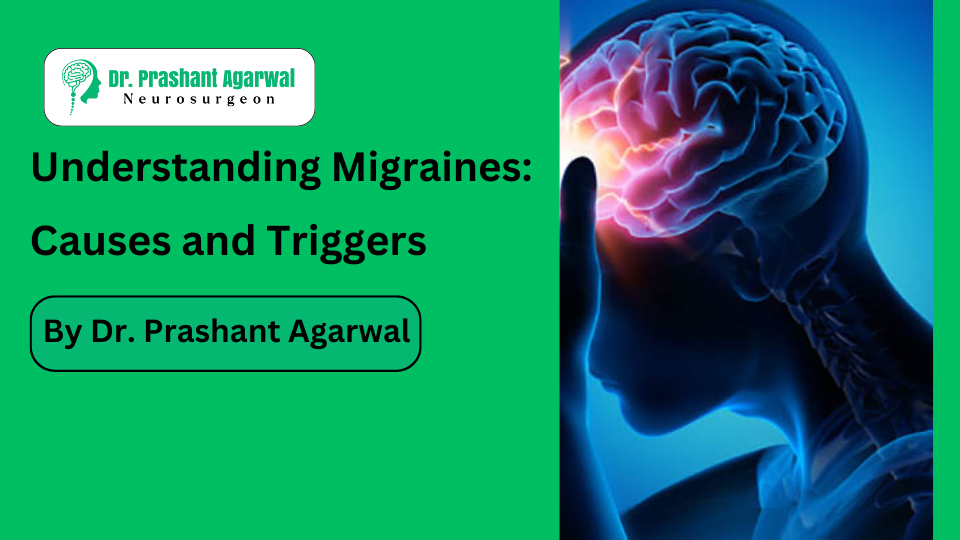In the bustling city of Greater Noida, migraines can disrupt daily life for many residents. Understanding the root causes and triggers of migraines is crucial for effective treatment and management. In this blog, we delve into the complexities of migraines, explore common triggers, and highlight the expertise of Dr. Prashant Agarwal, a distinguished migraine specialist in Greater Noida.
What Are Migraines?
Before delving into causes and triggers, let’s grasp what migraines truly entail. Migraines are neurological disorders characterized by recurrent, intense headaches often accompanied by other symptoms such as nausea, sensitivity to light and sound, and visual disturbances. They can vary in frequency, duration, and severity, affecting individuals differently.
Peering into the Causes:
While the exact cause of migraines remains elusive, several factors are believed to contribute to their development:
- Genetics: There’s a significant genetic component to migraines. If one or both parents have a history of migraines, there’s an increased likelihood of experiencing them.
- Neurological Dysfunction: Migraines involve abnormal brain activity, particularly in the areas responsible for pain processing and sensory perception.
- Chemical Imbalances: Fluctuations in certain neurotransmitters, such as serotonin, dopamine, and noradrenaline, are associated with migraines.
- Triggers and Environmental Factors: Various triggers, ranging from hormonal changes to dietary factors and stress, can precipitate migraine attacks.
Unlocking the Triggers:
Identifying and managing triggers is pivotal in migraine management. Common triggers include:
- Hormonal Changes: Fluctuations in estrogen levels, such as those occurring during menstruation, pregnancy, or menopause, can trigger migraines in susceptible individuals.
- Dietary Factors: Certain foods and beverages, such as aged cheeses, processed meats, caffeine, alcohol, and artificial sweeteners, are known migraine triggers for some people.
- Environmental Stimuli: Sensory stimuli like bright lights, strong smells, and loud noises can provoke migraines in sensitive individuals.
- Stress: Emotional stress, anxiety, and tension are notorious triggers for migraine attacks.
- Sleep Disturbances: Irregular sleep patterns, inadequate sleep, or excessive sleep can all trigger migraines.
Managing Migraines:
While migraines can be challenging to treat, various strategies can help manage and alleviate symptoms:
- Medications: Over-the-counter and prescription medications, including pain relievers, triptans, and preventive medications, can help alleviate symptoms and reduce the frequency of migraine attacks.
- Lifestyle Modifications: Adopting a healthy lifestyle, including regular exercise, adequate sleep, stress management techniques, and a balanced diet, can significantly reduce the frequency and severity of migraines.
- Avoiding Triggers: Identifying and avoiding triggers, whether they’re related to diet, environment, or lifestyle, can help prevent migraine attacks.
- Mind-Body Therapies: Techniques such as relaxation exercises, biofeedback, acupuncture, and cognitive-behavioral therapy can complement conventional treatments and provide relief from migraine symptoms.
Conclusion:
In Greater Noida, Dr. Prashant Agarwal stands as a beacon of hope for migraine sufferers, offering not only expert medical care but also compassion and understanding. Through his dedication to unraveling the mystery of migraines and his commitment to providing personalized, comprehensive treatment, Dr. Agarwal is making a difference in the lives of countless individuals. If you or someone you know struggles with migraines, don’t suffer in silence. Reach out to Dr. Prashant Agarwal and take the first step towards relief and reclaiming your life from the grip of migraines.
INTRODUCTION
Pediatric neurosurgery is a specialized field of medicine focused on treating neurological conditions in children. It combines intricate surgical techniques with a deep understanding of pediatric care to address issues affecting the brain, spinal cord, and nervous system.
What is Pediatric Neurosurgery?
Pediatric neurosurgery deals with the surgical management of neurological conditions in infants, children, and adolescents. This can include treating congenital disorders, tumors, trauma, and other issues related to the nervous system.
Common Conditions Treated
Brain Tumors: These are abnormal growths in the brain that can affect a child’s development and overall health. Surgical intervention may be required to remove or reduce the tumor.
Hydrocephalus: This condition involves an accumulation of cerebrospinal fluid in the brain, leading to increased pressure. A shunt may be placed to drain the excess fluid and relieve pressure.
Spinal Cord Disorders: Problems like scoliosis or spinal cord injuries are addressed through various surgical techniques to improve function and quality of life.
Traumatic Brain Injuries: Accidents or injuries can cause significant damage to a child’s brain. Neurosurgery aims to minimize damage and promote recovery.
The Surgical Approach
Pediatric neurosurgery involves delicate and precise techniques, often using advanced imaging and minimally invasive methods. Surgeons work closely with a multidisciplinary team, including pediatricians, radiologists, and anesthesiologists, to ensure the best outcomes for young patients.
Post-Surgery Care
After surgery, children typically need careful monitoring and follow-up care to ensure proper recovery. This can include physical therapy, medication, and regular check-ups to track progress.
Why Choose Specialized Care?
Pediatric neurosurgeons have specialized training and experience in treating children’s neurological conditions. They understand the unique needs of young patients and use techniques tailored to minimize impact on growth and development.
In Conclusion
Pediatric neurosurgery is a critical field that helps address complex neurological issues in children. By combining advanced surgical techniques with compassionate care, pediatric neurosurgeons like Dr. Prashant Agarwal work to improve outcomes and quality of life for their young patients.
For more information or to schedule a consultation, please reach out to our office.





